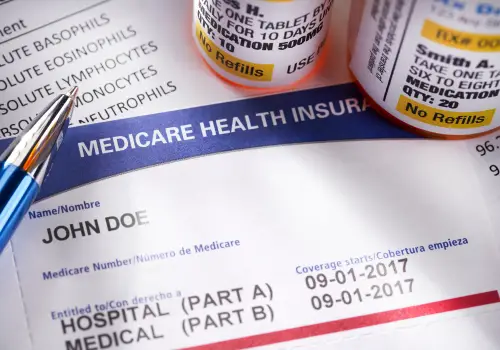Millions of Americans utilize and rely on Medicare for their health care coverage. Medicare coverage is essential to this group of people, and there may be others out there who are eligible but not yet enrolled.
So, how do you sign up for Medicare once you become eligible? The answer depends on a few factors, like age and whether you are already receiving Social Security benefits.
If you want to learn how to find out whether you are eligible for Medicare and sign up, keep reading. We will tell you everything you need to know to enroll in the program.
Medicare Eligibility
So, who is eligible to enroll in Medicare health insurance? The first step to enrolling in Medicare involves determining whether you are even eligible.
- Generally, Medicare is available to those 65 and older and younger people with disabilities.
- Medicare health coverage is also available to people with end-stage renal disease (ESRD) regardless of age.
Medicare is divided into parts A, B, and D. You might qualify for Part A coverage at no cost. If you are 65 or older and you or your spouse have enough work credits, you can qualify for premium-free Part A coverage.
You must have worked for at least 10 years and paid Social Security taxes to receive this coverage at no charge. In addition, if you receive retirement benefits from Social Security or the Railroad Retirement Board, you qualify for Part A coverage at no cost.
Similarly, if you have been entitled to disability benefits for 24 months, you can get free Part A coverage. The eligibility for Part B coverage is basically the same, although everyone must pay a Part B premium if they wish to enroll. If you have any type of Medicare coverage, you can enroll in a Part D prescription drug plan.
KEY TAKEAWAYS
- Medicare enrollment is available to those 65 and older and younger people with disabilities or those with end-stage renal disease.
- You can sign up for Medicare Part A, B or D each part covers different medical expenses. Medicare Part C or Medicare advantage allows you to combine coverage into a single plan through a private insurer.
- You can enroll in Medicare by visiting a local SSA office or by completing the online application.
Medicare Coverage Basics
You have heard about the different parts of Medicare, but what do they each mean? The different coverage options can often be confusing, so here are the details about each part of Medicare.
We will discuss the basics of each part and some examples of what it covers. Also, it would be best if you remembered that Medicare and Medicaid services are significantly different. There are big differences between Medicare and Medicaid, so here are the basics about Medicare coverage. Medicare Part A and B are often referred to as Original Medicare.
-
Medicare Part A
What does Medicare Part A cover? Medicare Part A or hospital insurance. It would be like medical insurance that you would use for hospital care. It covers hospital stays for inpatient care, hospice care, and home health care. Part A will also pay for care in a skilled nursing facility or nursing home. However, the facility must be a skilled nursing facility, as Medicare will not pay for long-term care in a nursing home.
-
Medicare Part B
So, what does Medicare Part B cover? Medicare Part B is similar to your primary health insurance. It pays for outpatient care, preventive services, and medically necessary services. These are things like regular doctor office visits. Part B also pays for items you might not usually consider, like durable medical equipment, ambulance services, clinical research, or dialysis treatments. In addition, Part B covers mental health services as well. While Part B is generally limited to outpatient services, it will cover inpatient, outpatient, and partial hospitalization for mental health care. Most preventive care, like health screenings and vaccines, is free for Part B beneficiaries.
-
Medicare Part C
Part C refers to Medicare Advantage plans available from private insurance companies. These companies contract with Medicare to provide at a minimum Part A and Part B coverage. The things that these plans cover vary by plan provider. However, at a minimum, the plans must cover at least the same items that Medicare itself covers. Each insurance company can set its own monthly premium amounts, copayments, deductibles, coinsurance, and other out-of-pocket costs related to the plan. Some people choose to add other coverages like dental care and vision plans.
There is no requirement to get an Advantage plan to participate in the Medicare program, but some people find them easier to manage and are often afforded additional benefits by some of the companies. -
Medicare Part D
Part D is essentially your prescription drug plan. Private insurance companies also administer these plans, and you will need to join as soon as your Medicare eligibility begins, or you might pay a penalty for joining late. If you miss the deadline, you might need to wait until next year's open enrollment period. These Medicare benefits will pay for your prescription medication. However, each plan provider decides which drugs and medicines they will cover. You should thoroughly research the Part D plan you are considering before enrolling to ensure it meets your needs.
Must read articles related to Medicare
- How do you get a Medicare Flex card for seniors?
- What documents do I need to apply for Medicare?
- Who is eligible for Medicare?
- If I am on Social Security, do I automatically get Medicare coverage?
- Overview of what is covered under Medicare.
When To Enroll In Medicare
We have discussed the different parts of Medicare and who is eligible for coverage, but when do you need to enroll? The time at which you enroll can significantly affect the premium you pay, so you will want to make sure that you enroll at the proper time that leads to the lowest costs for you.
Automatic Enrollment
For some people, you are automatically enrolled based on other factors. If you are already receiving Social Security retirement benefits, you will be automatically enrolled on the first day of the month you turn 65. Your Medicare card will generally arrive about three months before your 65th birthday so that you are ready to start using it as soon as you are enrolled.
Similarly, if you are eligible for Social Security disability benefits for 24 months, you will be automatically enrolled in Original Medicare.
- Since automatic enrollment includes Parts A and B, you must decline the Part B coverage if you do not wish to pay those premiums.
Initial Enrollment Period
For those not already receiving Social Security retirement benefits, your initial enrollment period for Medicare begins 3 months before your 65th birthday, includes your birthday month, and ends three months after your birthday.
Once eligible for Medicare, you must sign up during this initial enrollment period. If you miss signing up during the initial enrollment period, you will most likely pay higher premium fees and probably need to pay a late enrollment penalty.
Even if you do not sign up during the initial enrollment period, you may still sign up during a special enrollment period described below or during open enrollment.
Special Enrollment Period
Some people who turn 65 may still be enrolled through a group health plan through their employer. In that case, you may not want to enroll in Medicare Part B at that time.
- For these individuals, a special enrollment period applies. You may enroll in coverage whenever your group health plan still covers you. In addition, this period runs for 8 months after your employment or coverage ends.
Medicare also provides a general enrollment period from January to March each year, during which anyone eligible may sign up for Medicare. Many people sign up during this open enrollment period each year.
TIP
Most people sign up for Medicare during the initial enrollment period. However, if you have existing healthcare coverage through an employer, you may be eligible for a special enrollment period at a later date.
How To Sign Up For Medicare Coverage
Medicare enrollment is not tricky. If you qualify for automatic enrollment, then there is nothing that you need to do! You will be signed up automatically and receive your card in the mail. Your coverage starts on the first day of the month when you turn 65. It is that simple!
If, however, you need to enroll manually, then you have a few options.
In-Person Enrollment
First, you can visit your local Social Security office to sign up. Since the Social Security Administration (SSA) plays a significant role in Medicare eligibility, they help manage and maintain enrollment.
Online Enrollment
However, the easiest way to sign up is by completing the online application for Medicare. Signing up for Medicare online is the fastest and easiest way to start your Medicare benefits. It will save you time and energy and avoid a trip to the Social Security office. If you have any questions about the process, contact Social Security and ask for assistance.
The Bottom Line
If you are eligible for Medicare, getting signed up is not difficult. In some cases, you will be automatically enrolled without any action on your part.
At other times, you can complete an online application to enroll. Deciding which coverage to select might be the most challenging part of the process.
Frequently Asked Questions
You do not need any documents to get signed up. You can simply apply for Medicare online. The information requested is not that extensive because the Social Security Administration already has most of the information that they need.
You will need to provide your name, Social Security number, date of birth, and perhaps information about your current medical coverage. Besides that, there is nothing else that you will be required to show.
Some people are eligible to receive Part A coverage at no cost. Since Medicare is funded through Social Security tax payments, you must have paid into the system long enough to get free coverage.
- If you do not qualify for premium-free coverage, then you will pay either $285 up to $518 per month for coverage in 2025 depending on how many work credits you have.
- For Part B coverage, it will cost you $185 in most cases. If you have a high income, then your premium might be more, up to $630 monthly.
For Medicare Advantage plans, the private insurance carriers can set their own rates for the insurance. You can learn more about Medicare costs on the Medicare website.
Technically, no, there is not a deadline. However, it is usually best to sign up during your initial enrollment period to avoid higher premiums and late penalties.
However, you can still get signed up during a special enrollment period or the annual open enrollment period.
If you have qualified for Social Security disability benefits, then you will be automatically enrolled after you have been qualified for those benefits for 24 months.
If you do not currently receive these benefits, then you will first need to apply for disability benefits. Eligibility for Medicare for disabled people depends on their disability determination through the Social Security Administration. There is no separate Medicare disability eligibility.
You can find a Social Security Administration office near you by using our SSA office locator and searching for your closest location.






